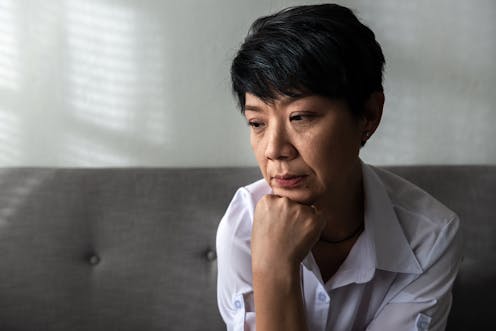
There are up to 29,000 people aged under 65 living with dementia in Australia. Our new research shows people with young onset dementia experience delays to diagnosis and a faster decline in their cognitive abilities than older people with the condition.
They must also tackle a challenging maze of accessing support services across both a disability system inexperienced with their care and an aged-care system not suited to meet their needs.
Using the strengths of both sectors could prevent people with young onset dementia from falling through the cracks.
When dementia meets busy lives
People with young onset dementia (defined as any form of dementia that begins before age 65) are usually in their 50s and early 60s. They experience progressive memory loss, difficulty with planning and decision-making, personality changes, and/or language difficulties.
Many people with young onset dementia (also referred to as younger onset or early onset dementia) have dependent children, ageing parents, high-pressure jobs and significant financial responsibilities.
Dementia in younger people is also often misdiagnosed (most commonly as a psychiatric illness like depression), with a four-year average wait for an accurate diagnosis.
All this leads to much higher rates of psychological distress and poorer well-being among young people with dementia and their family members than their older counterparts.
We systematically reviewed 30 studies on Alzheimer’s disease, vascular dementia and frontotemporal dementia. Our analysis demonstrated younger people with dementia experience a faster progression of their symptoms than older people with dementia.
Studies that tracked symptoms over time showed that, while younger people generally maintained better physical health than older people while living with dementia, their thinking and language difficulties can worsen quickly.
This has an important impact on their care and support needs – and how often these needs are assessed.
Read more: Where you live affects your dementia risk
A tipping point at 65
Because the likelihood of developing dementia rises sharply with age, most people with dementia are older than 65.
The unique needs of younger people with dementia prompted the federal government to move funding for their care and support services to the National Disability Insurance Scheme (NDIS) in 2016. Older people with dementia continue to be supported by the aged-care system.
This division means people with young onset dementia sit at the intersection of two complex service systems. They can access services to support their independence and community participation via the NDIS, but dementia-specific services and housing are still largely delivered by the aged-care sector.
Aged-care providers face difficulty providing tailored support services due to complex eligibility rules, and many have withdrawn their specific programs for young onset dementia.

Read more: Genetic testing: Should I get tested for Alzheimer's risk?
An annual NDIS review is not enough
The disability sector has little experience with delivering dementia care. Most NDIS participants are aged under 35 years and live with disabilities such as autism, intellectual disabilities and hearing impairments that remain relatively stable over their lifetime.
The sometimes rapidly progressive nature of young onset dementia means care needs can change more quickly than the standard yearly reviews offered by the NDIS. So even when people with young onset dementia receive adequate funding to suit their needs, these needs may change quickly. And there is a major shortage of disability service providers with dementia expertise with whom they can spend their funding.
This is especially true in rural and remote areas, where there may only be one or two people with young onset dementia across a large geographical area.
Strict eligibility rules about the “significance” of disability can also delay NDIS access. People newly diagnosed with young onset dementia may have mild impairments – but there are major benefits to early intervention.
Young people with dementia and their families frequently have to navigate their own care needs and educate the providers they encounter along the way. This can increase their stress.
Aged care isn’t the answer
Despite the difficulties people with young onset dementia and their families experience, our research tells us they want their care to remain in the disability system rather than revert back to the aged-care system. The NDIS philosophy of a strengths-based approach to maximise independence is valued.
The disability sector needs to be better equipped to support people with young onset dementia and others who have progressive impairments.
Training for the disability workforce about progressive neurological conditions including dementia would be a good first step.
Beyond training, better integration of the aged and disability sectors could have mutual benefits.
The disability sector can learn and grow from the rich dementia expertise of the aged care workforce. And the aged care sector can benefit from the disability sector’s experience with delivering strengths-based and goal-directed care. Hours of testimony from the Royal Commission into Aged Care Quality and Safety highlight how desperately this is needed.
Flexibility in funding rules around the 65-year-old NDIS cutoff point could see co-delivered services capitalise on these respective strengths.
Flexibility could also ensure people aged close to 65 years at the time of their dementia diagnosis can make informed choices about the sector from which they will seek support. Then suitable care that can adjust to their changing needs will stop them falling through the cracks.
Monica Cations receives funding from the National Health and Medical Research Council Medical Research Future Fund and the South Australian Hospital Research Foundation.
This article was originally published on The Conversation. Read the original article.







